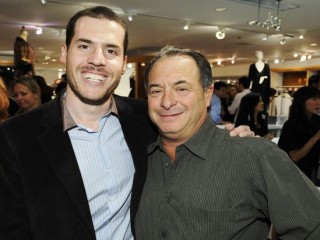
Bobby Margolis biography
Date of birth : -
Date of death : -
Birthplace : U.S.A
Nationality : American
Category : Famous Figures
Last modified : 2011-09-08
Credited as : businessman, Cherokee clothing line,
3 votes so far
Born in 1948, Margolis was a partner in a company that made cult-favorite jeans under the brand name "A. Smile" and was known by its donkey logo. He joined Cherokee in 1981, not long after he sold A. Smile, and was hired along with Jay Kester whom he already knew from the garment business to expand the Cherokee brand from shoes into clothing. Cherokee had its origins in a shoe-repair business in Beverly Hills, California, run by a Greek immigrant named James Argyropoulos. In 1973, Argyropoulos started selling the hand-crafted sandals he made out of the shoe-repair shop, which were based on Greek-island footwear and were a hit with the Southern California hippie crowd. Argyropoulos hoped to replicate that success in apparel, and put up three-quarters of the start-up money for the venture, which he let Margolis and Kester run, but took a 55 percent ownership stake.
Margolis and Kester invested some of their own capital in the apparel line, which originally functioned as a separate company from Argyropoulos' original Cherokee. Launched in 1981, its juniors' line did extremely well in its first years of operation, and they soon added a misses' line. In 1983, when sales from Cherokee clothing far eclipsed revenues from the footwear company, the two entities merged and Cherokee became a publicly traded company. Margolis became chief operating officer, but sales began to drop, and in 1988 he and Kester led a leveraged buyout that resulted in Argyropoulos' departure and a hefty payout to him as founder. The $166 million deal was aided by a newly formed acquisition group part of a Wall Street investment group, in the leveraged-buyout mania of the era which made Margolis its chief executive and put him in charge of Cherokee.
Margolis was named president and chief executive officer of Cherokee in June of 1990, and the com- pany appeared to be on the upswing once again within a year. There were even plans to take it public once again. "We've always been consistent in our emphasis, which is good quality, affordable fashion," Margolis told Michael Marlow in a WWD article discussing the turnaround. "We stay away from being trailblazers, and we look for the overall trends, not the fads." Unfortunately, the company was still burdened with debt from the 1988 buyout, and was forced to file for Chapter 11 bankruptcy. A court-ordered restructuring plan followed, and Margolis, now also board chair, sought to license the Cherokee brand to international retailers to bring in much-needed revenue, but had little success.
Margolis resigned all of his positions at Cherokee in October of 1993 and started his own investment group. Cherokee, meanwhile, was still struggling, and filed once again for Chapter 11 bankruptcy protection. Finally, one of the company's bondholders invited Margolis to return as chair and chief executive. He agreed, but with one caveat: that the board would allow him to sell off the entirety of Cherokee's manufacturing assets. "They looked at me like I was a heretic," he told Leigh Gallagher in Forbes . This time, his investment group put up money for a 25 percent stake in the company, and he officially rejoined Cherokee as chair and chief executive officer May of 1995. Over the next few months, he sold off all the manufacturing assets, and used the proceeds to finally relieve the company of its staggering $14 million in debt. In the end, it was left with $3 million in cash, no inventory, a few key managers, and the Cherokee brand name, its only real property.
Margolis came up with a strategy whereby retailers would pay Cherokee a licensing fee to use that brand name, which had a good recognition factor among consumers as affordable apparel and footwear. Cherokee executives would have a say in the design, but the retailers would shoulder all manufacturing costs themselves and then pay Cherokee a one to three percent royalty on sales for use of the name. The Target Corporation of Minneapolis, Minnesota, was the first major deal that Margolis struck, and the line sold so well that within two years Cherokee and Target had signed an exclusive deal, meaning the Cherokee brand would be available in United States only at Target stores. Licensing arrangements outside the United States also proved lucrative: The Zellers chain in Canada began to manufacture and sell the Cherokee lines, as did supermarket/retail-discount giant Tesco in Britain and France-based mega-market operator Carrefour.
Margolis' talent for licensing even led to another success story for Target, this one involving clothing designer Mossimo Giannulli. In 1999, Giannulli, whose Mossimo line was on the verge of bankruptcy, asked Margolis for help in wooing Target. Margolis made the introductions and helped arrange the licensing deal, and even took a small royalty fee on Mossimo sales for his effort. Thanks to this and other equally lucrative deals, Margolis' small, Van Nuys, California-based company was the secret pick of the savvy Wall Street investor. Bobby Melnick, a hedge-fund manager, told Forbes' Gallagher that Cherokee stock "had a valuation that was next to nothing, and yet it was producing gobs and gobs of cash. It's a unique and highly profitable business model that almost no one on Wall Street knows about."
Margolis has been married twice, and has a grown son and daughter. Salary surveys ranking the top apparel-industry executives in the United States place him just after Ralph Lauren himself, with Margolis taking home a $4.44 million compensation package in 2005.
















